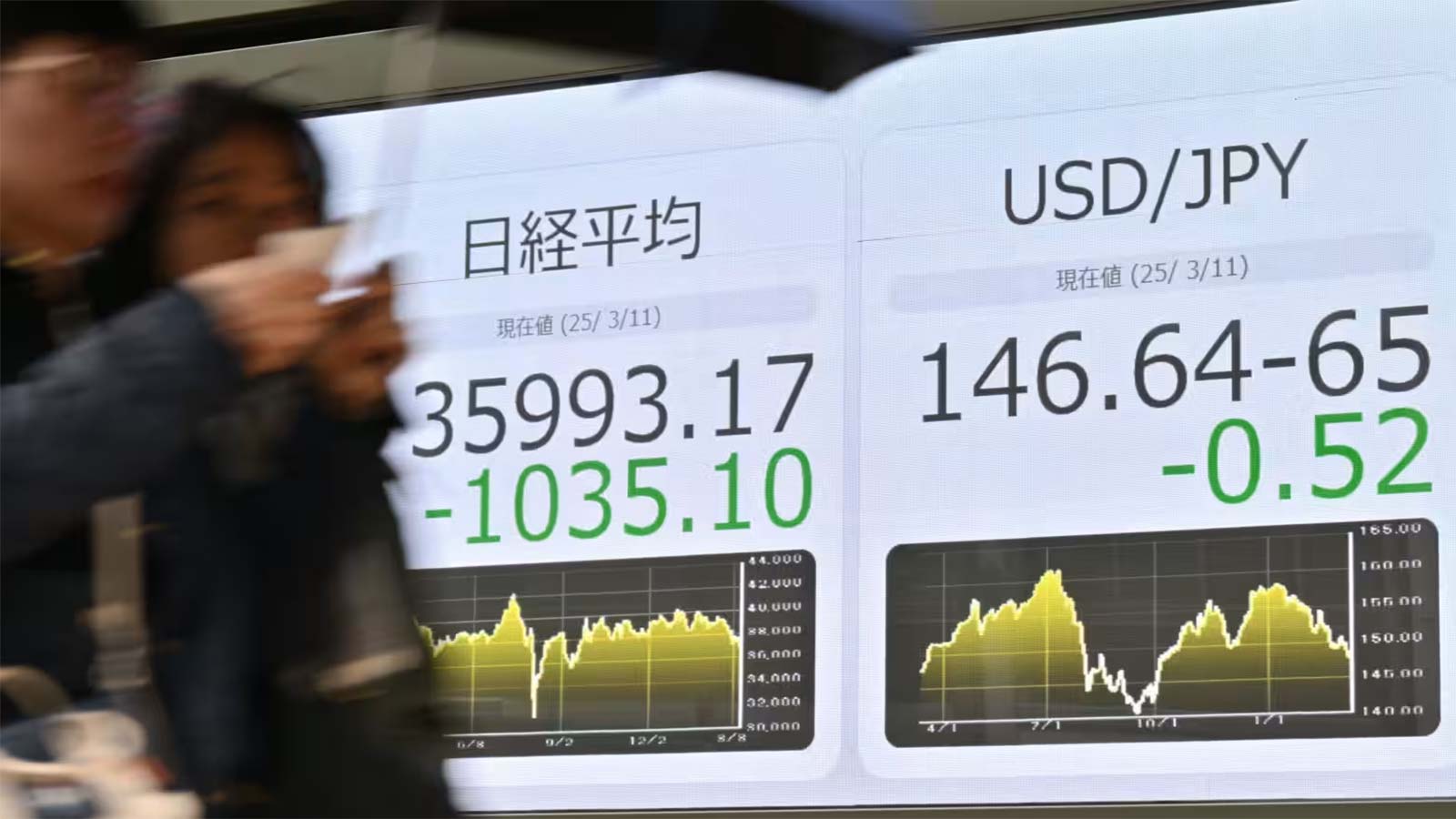- Japan’s Nikkei 225 fell 2.75% to 33,780.58, down 20% from its July peak.
- Topix index declined 3.37% to 2,482.06 amid market turmoil.
- Trump’s tariffs on 180 countries sparked fears of a global trade war.
- Asia-Pacific markets broadly declined, with Australia’s ASX 200 down 2.44%.
- U.S. stocks also suffered steep losses, with the Nasdaq falling nearly 6%.
Japan Stocks Lead Asia-Pacific Declines Amid Tariff Concerns
Japan’s stock markets took a significant hit on Friday, with the Nikkei 225 falling 2.75% to close at 33,780.58, marking a 20% drop from its July peak. The broader Topix index also declined sharply, losing 3.37% to close at 2,482.06. These declines come as global markets react to U.S. President Donald Trump’s announcement of sweeping tariffs on over 180 countries, raising fears of a global trade war.
Trump Tariffs Spark Global Market Turmoil
On Wednesday, President Trump unveiled reciprocal tariff rates targeting countries that impose higher tariffs on U.S. goods. The tariffs, which range from 10% to 54%, aim to address what the administration calls “unfair trade practices.” However, the announcement has sent shockwaves through global markets, with investors fearing the economic repercussions of a potential trade war.
In the U.S., the major indices experienced their worst day since 2020. The Dow Jones Industrial Average plummeted 3.98%, the S&P 500 fell 4.84%, and the Nasdaq Composite dropped 5.97%. These losses have reverberated across Asia-Pacific markets, with Japan leading the declines.
Asia-Pacific Markets Follow Suit
Beyond Japan, other Asia-Pacific markets also faced significant losses. Australia’s S&P/ASX 200 fell 2.44% to close at 7,667.8, sliding into correction territory after declining 11% since its February high. South Korea’s Kospi slipped 0.86% to 2,465.42, while the small-cap Kosdaq managed a slight gain of 0.57% to 687.39. Markets in Hong Kong and China were closed for the Qingming Festival.
Thailand’s SET Index dropped over 2%, reaching its lowest level in five years, while Vietnam’s stock market extended its losses, with the Vietnam Index falling 3% due to declines in the energy and technology sectors.
Impact on Japanese Automakers
Japanese automakers were among the hardest hit by the market turmoil. Toyota’s shares fell 4.19% to their lowest level since September, while Honda declined 5.30% and Nissan dropped 4.04%. Mazda and Mitsubishi also saw significant losses, with their stocks falling 4.28% and over 3%, respectively. The tariffs are expected to disproportionately affect automakers due to their reliance on global supply chains.
Global Economic Concerns
Economists and analysts have expressed concerns over the broader economic impact of the tariffs. Chris Kushlis, chief emerging markets macro strategist at T. Rowe Price, noted that the tariffs could pose a significant headwind to growth for trade-oriented economies in Asia. “Many Asian economies have a relatively high proportion of their export value added that ends up in the U.S., so the broad application of tariffs globally will hinder efforts to redirect trade,” he said.
The technology sector is also expected to bear a significant burden, with CreditSights estimating that the tariffs could cost the U.S. tech industry nearly $100 billion. Apple, which relies heavily on Chinese manufacturing, is particularly vulnerable, despite its efforts to diversify supply chains to Vietnam and India.
U.S. Markets and Investor Sentiment
In the U.S., the market sell-off wiped out $1.7 trillion in market capitalization from the S&P 500 alone. Companies with significant reliance on foreign production, such as Apple and Nike, saw steep declines. Nike’s shares tumbled nearly 12%, while Apple lost 9%.
Goldman Sachs has revised its oil price forecasts downward, citing the potential for a global economic slowdown. Brent crude fell 0.41% to $69.85 per barrel, while West Texas Intermediate futures dropped 0.45% to $66.65 per barrel.
Outlook and Reactions
The global reaction to Trump’s tariffs has been mixed. While some view the measures as a necessary step to address trade imbalances, others warn of the potential for a global recession. European Commission President Ursula von der Leyen has called for negotiations to resolve the trade tensions, while China has demanded the immediate revocation of the new tariffs.
In Japan, the government and businesses are closely monitoring the situation. The steep declines in the Nikkei and Topix indices underscore the vulnerability of Japan’s export-driven economy to global trade disruptions.
As markets continue to react to the tariff announcement, uncertainty remains high. Investors are bracing for further volatility, with safe-haven assets like gold and the Japanese yen gaining traction. The coming weeks will be critical in determining the long-term impact of these tariffs on the global economy and financial markets.
Sources: CNBC, Reuters, Bloomberg









